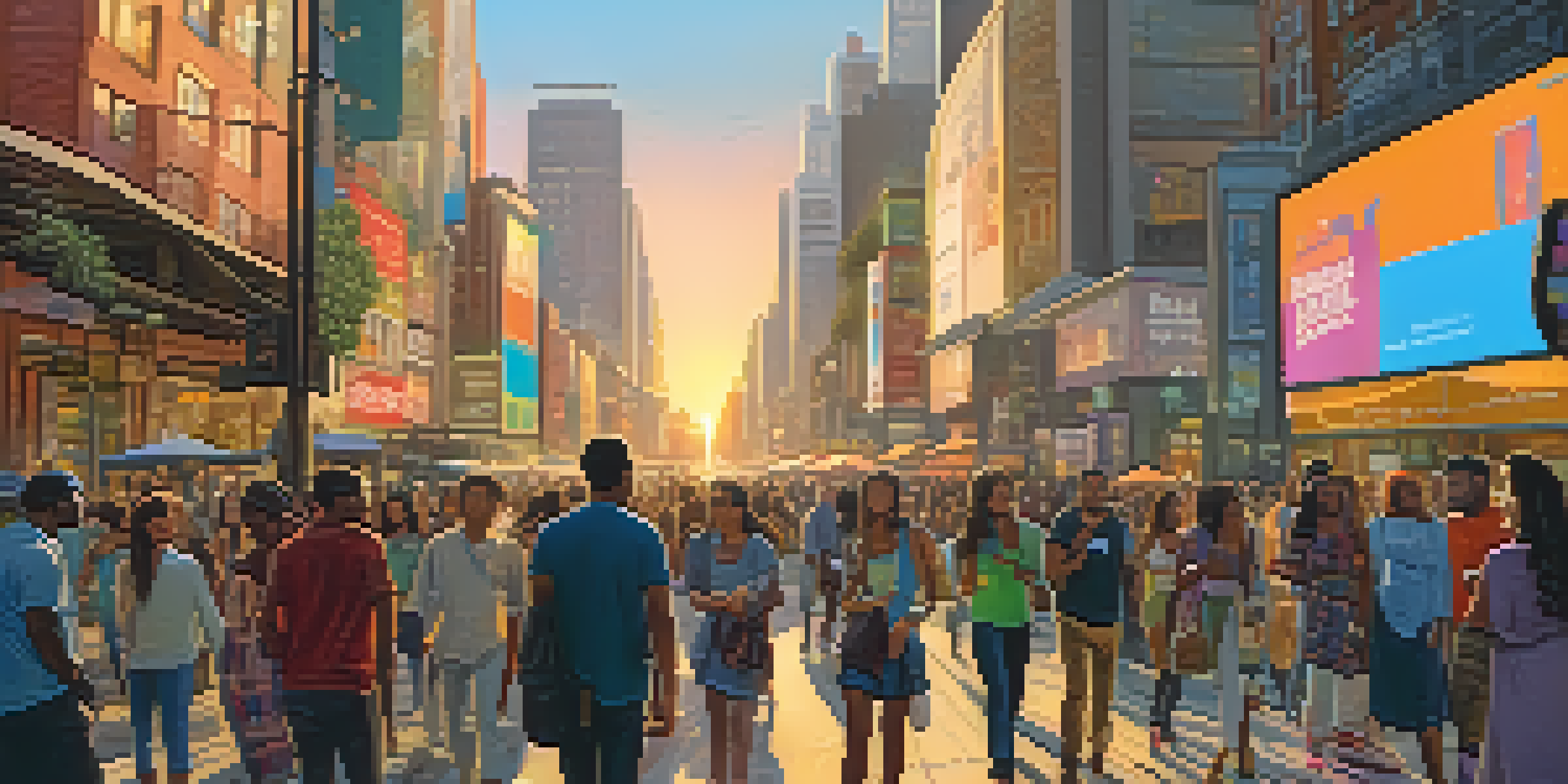The Role of Social Media in Carving Evolution

Understanding Social Media's Influence on Evolution
Social media has become a powerful tool in shaping societal evolution. It acts as a platform where ideas, opinions, and trends can spread rapidly, influencing public perception and behavior. Just like a pebble creates ripples in a pond, a single post can spark conversations that lead to significant changes in cultural norms and values.
Social media is not just an activity; it is an investment of valuable time and resources. It can take your business to the next level.
The interconnectedness of social media allows for diverse voices to be heard, leading to a richer tapestry of ideas. This democratization of information encourages dialogue and debate, which can drive evolutionary change in societal attitudes. For instance, movements like #MeToo and climate activism have gained momentum through social media, highlighting its role in fostering collective awareness and action.
Moreover, the real-time nature of social media means that feedback loops are instantaneous. This encourages constant adaptation and evolution of ideas, as users respond and refine their perspectives based on interactions. In this way, social media not only reflects societal changes but actively participates in shaping them.
The Role of Social Media in Cultural Evolution
Cultural evolution is heavily influenced by social media, which serves as a mirror reflecting and shaping cultural norms. Trends can emerge overnight, with dances, memes, and language evolving at a rapid pace. For example, platforms like TikTok have popularized new forms of expression that can redefine what is considered 'cool' or relevant in youth culture.

Additionally, social media has facilitated the blending of cultures, allowing for a more globalized perspective. Users can share and celebrate their cultural practices, leading to a fusion of ideas and traditions. This cross-pollination enriches cultural landscapes, making them more dynamic and inclusive.
Social Media Shapes Cultural Norms
Social media acts as a catalyst for cultural evolution by rapidly spreading trends and facilitating cross-cultural exchanges.
However, this rapid evolution can also lead to cultural appropriation, where elements of one culture are adopted without understanding their significance. It’s crucial for users to navigate this landscape with sensitivity and awareness, fostering respect for diverse backgrounds while enjoying the richness that social media brings to cultural evolution.
Social Media's Impact on Political Evolution
Political evolution is another area significantly impacted by social media. It serves as a platform for political discourse, enabling the rapid dissemination of information and mobilization of movements. The Arab Spring is a prime example, where social media played a crucial role in organizing protests and amplifying voices demanding change.
The great thing about social media is that it gives everyone a voice. The challenge is that many people don't know how to use it responsibly.
Furthermore, social media has changed how politicians connect with constituents. They can engage directly with voters, share their platforms, and respond to issues in real-time. This level of interaction can foster a sense of accountability, pushing political figures to be more responsive to the public’s needs.
However, this accessibility comes with challenges, such as the spread of misinformation. The rapid sharing of unverified information can lead to confusion and polarization. Thus, while social media has the power to drive political evolution, it also requires users to approach information critically.
The Role of Influencers in Evolutionary Change
Influencers play a pivotal role in shaping trends and opinions on social media. Their ability to reach large audiences makes them powerful agents of change, as they can sway public perception on various issues, from fashion to social justice. For instance, when influencers advocate for sustainability, they can encourage their followers to adopt more eco-friendly practices.
Moreover, influencers often serve as relatable figures who can make complex issues more accessible. They break down barriers, allowing their audiences to engage with topics they might not have considered otherwise. This relatability can inspire action and drive evolutionary change in behaviors and attitudes.
Political Discourse Transformed
The rise of social media has revolutionized political engagement, allowing for direct interaction between politicians and constituents.
However, the influencer culture also raises questions about authenticity and responsibility. As followers look to influencers for guidance, it’s crucial for these figures to be conscious of the messages they promote. This balance between influence and integrity can significantly impact the direction of societal evolution.
The Psychological Effects of Social Media on Evolution
Social media's psychological effects play a significant role in how individuals and societies evolve. It can foster connections and a sense of community, but it can also lead to feelings of isolation and anxiety. The constant comparison to curated lives online may affect self-esteem and mental health, prompting societal conversations about authenticity and well-being.
Moreover, social media can act as a double-edged sword in terms of information consumption. While it provides access to diverse perspectives, it can also create echo chambers where individuals only engage with like-minded opinions. This can stifle critical thinking and inhibit the evolution of more nuanced viewpoints.
Understanding these psychological effects is crucial for fostering healthier social media habits. By promoting positive interactions and encouraging critical engagement, users can help create a more supportive online environment that contributes to personal and societal evolution.
The Future of Social Media and Evolutionary Trends
Looking ahead, the future of social media is likely to be shaped by ongoing technological advancements and changing user needs. As platforms evolve, so will the ways in which they influence societal norms and trends. Innovations such as virtual reality and AI could redefine how we interact and share ideas, potentially accelerating the pace of evolutionary change.
Additionally, the growing awareness of mental health and well-being may prompt shifts in how social media is used. Users are increasingly seeking platforms that prioritize authenticity and meaningful connections over superficial interactions. This shift could foster a more positive online culture, contributing to healthier societal evolution.
Influencers Drive Societal Change
Influencers play a crucial role in shaping public opinion and behaviors, making complex issues more relatable and accessible.
Ultimately, the relationship between social media and evolution is dynamic and multifaceted. As society continues to navigate these changes, it will be essential to harness the positive aspects of social media while mitigating its challenges, ensuring a balanced approach to progress.
Strategies for Harnessing Social Media for Positive Evolution
To leverage social media for positive evolutionary change, individuals and organizations must adopt intentional strategies. Creating content that emphasizes authenticity and meaningful engagement can help build a supportive online community. Sharing personal stories and experiences can resonate with others and inspire collective action.
Additionally, fostering critical thinking among users is crucial. Encouraging audiences to question information and seek diverse perspectives can combat misinformation and promote healthier dialogue. Educational campaigns focused on media literacy can empower users to navigate the social media landscape more effectively.

Finally, collaboration among users, influencers, and organizations can amplify efforts for positive change. By working together, these stakeholders can create a more inclusive and impactful online environment, ultimately driving social evolution in a direction that benefits everyone.